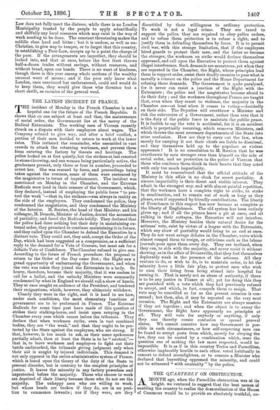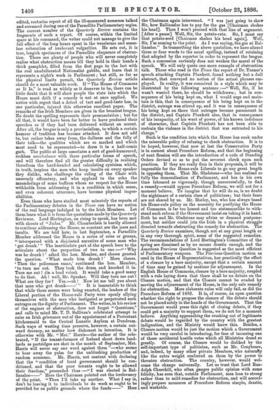THE QUARTERL Y ON OBSTRUCTION.
A,.MONTH ago, when the Parnellite obstruction was at its ..LX. height, we ventured to suggest that the best means of enabling the country to realise the demoralisation of the House of Commons would be to provide an absolutely truthful, nn-
edited, verbatim report of all the ill-mannered nonsense talked and screamed during one of the Parnellite Parliamentary orgies.
The current number of the Quarterly Review contains the
fragments of such a report. Of course, within the limited apace at his command, the writer could not manage to give the fragments of such a report. Of course, within the limited apace at his command, the writer could not manage to give the full effect of the long hours spent in the wearisome and sense- less reiteration of irrelevant vulgarities. He sets out, it is true, longish specimens of the Parnellite eloquence of obstruc- tion. There are plenty of people who will never completely realise what obstruction means till they hold in their hands a thick pamphlet, filled from the first page to the last with the real unadulterated Nationalist gabble, and learn that it
represents .a night's work. in Parliament ; but still, as far as the physical limits permit, the Quarterly Review article
should do a most valuable work. If " The House of Commons as It Is," is read as widely as it deserves to be, there can be little doubt that it will show people the state into which the House must drift if a remedy is not at once applied. We notice with regret that a defect of tact and good-taste has, in one particular, injured this otherwise excellent paper. The remarks of the Irish Members are given in the broadest brogue. No doubt the spelling represents their pronunciation ; but for all that, it would have been far better to have produced their speeches as if they had been delivered without an accent. After all, the brogue is only a provincialism, to which a certain humour of tradition has become attached. It does not add to, but rather takes away from, the dullness and the folly of their talk—the qualities which are so marked and which most need to be represented—to dress it in a half-comic garb. The public at large associates a sort of good-humoured,
reckless nonchalance with these particular forms of speech, and will therefore find all the greater difficulty in realising
therefrom the hard-headed and calculating cynicism which, in truth, inspires the men who heap insults on every speaker they dislike, who challenge the ruling of the Chair with
unseemly effrontery, and who applaud to the echo the maunderings of some buffoon whom no respect for the House withholds from addressing it in a condition in which sense, and even coherent utterance, have become physical impos- sibilities.
Even those who have studied most minutely the reports of the Parliamentary debates in the Times can have no notion of the real language indulged in by the Irish Members. Let them learn what it is from the quotations made by the Quarterly Reviewer. Lord Harlington, on rising to speak, has been met with shouts of "Judas." Mr. Chamberlain is hardly allowed to continue addressing the House, so constant are the jeers and insults. We are told hoW, in last September, a Parnellite Member addressed the House in a series of cries or groans, " interspersed with a disjointed narrative of some man who got drunk.' " The inarticulate part of-the speech bore to the articulate about the proportion of two to one :—" Why was he drunk ? ' asked the hon. Member, and cheers greeted the question. What made him drunk ? ' More cheers. ' Then the policeman came,' continued the hon. Member, 'to turn me out. They took the drum and knocked it in. Turn me out 1 (in a loud voice). It would take a good many to do that. Ah I well, Mr. Speaker. Will they turn me out ? What are they for I Yes,—ah I Now let me tell you about that man who got drunk—' " It is lamentable to think that while these scenes were being enacted, the leaders of the Liberal portion of the Home-rule Party were openly allying themselves with the men who instigated or perpetrated such outrages on the dignity of Parliament. The writer, in his review of the engines of obstruction, does not forget " Questions," and calls to mind Mr. T. D. Sullivan's celebrated attempt to raise an Irish grievance out of the appointment of a Protestant kitchenmaid to the Central Lunatic Asylum at Dundrum. Such ways of wasting time preserve, however, a certain out- ward decency, no matter how dishonest in intention. It is otherwise with Mr. " Mat." Harris—the author of the cele- brated, " If the tenant-farmers of Ireland shoot down land- lords as partridges are shot in the month of September, Mat. Harris will never say one word against them "—who seems to bear away the palm for the unblushing production of random nonsense. Mr. Harris, not content with declaring that the " condition of local government should be con- ditioned, and that the poor tenants ought to be allowed their freedom," proceeded thus :—" I was elected in Bal- linasloe--" Here the Chairman pointed out the irrelevancy of the point. "Then I'll take up another. What I say is, don't be leaving it to individuals to do work as ought to be
provided for on public grounds where the funds " Here the Chairman again intervened. "I was just going to show Sir, how Ballinasloe has to pay for the gas [Chairman shakes his head]. Then I won't proceed with that line of argument. [After a pause] Well, Sir, the potato-rate. Sir, I must say that potato-seed [Chairman shakes his head again]. Well, Sir, I'm coming to the point. As I was saying, the gas at Bal- linasloe." In transcribing the above quotation, we have altered three or four words to the usual spelling, instead of retaining that adopted by the reporter in order to represent the brogue. Such a concession certainly does not weaken the moral of the speech. We will only quote one more example of obstruction
talk. Those who read in the Times the report of Dr. Tanner's
speech attacking Captain Plunkett, found nothing but a dull abstract, that conveyed no notion of the actual phrases em- ployed. In reality, it was conceived in a style which may be illustrated by the following sentence :—" Well, Sir, if he wasn't wanted there, he should be withdrawn ; but in con- sequence of his being kept on, what I would urge and main- tain is this, that in consequence of his being kept on in the district, outrage was stirred up, and it was in consequence of his being kept on there that outrages became paramount in the district, and Captain Plunkett also, that in consequence of his incapacity, of his want of power, of his known indolence of character, that Captain Plunkett has not been able to restrain the violence in the district that was entrusted to his charge."
Such is the condition into which the House has sunk under the miserable policy of refusing to check obstruction. It is to be hoped, however, that now at last the Conservative Party is in earnest about Procedure Reform, and that the beginning of next Session will see the introduction of a code of Standing Orders devised so as to put the severest check upon such practices. If they are really firm in their proposals, it will be impossible for the Home-rule Liberals to go any great length in opposing them. That Mr. Gladstone—who has realised so fully the demoralisation of Parliament, and has in his own time laboured so vigorously, though unsuccessfully, to find a remedy—would oppose Procedure Reform, we will not for a moment believe. To imagine that he will do so, is no doubt the nightmare of a certain class of politicians; but their fears are not shared by us. Mr. Morley, too, who has always based his Home-role policy on the necessity for purifying the House of Commons, is far too honest and too statesmanlike to with- stand such reform if the Government insist on taking it in hand. Both he and Mr. Gladstone may advise or demand postpone- ment, but neither could join the Irish in a physical struggle directed towards obstructing the remedy for obstruction. The Quarterly Review examines, though not at any great length or in any very thorough spirit, some of the suggested remedies. The recommendations of Lord Hartington's Committee of the spring are dismissed as by no means drastic enough, and the American Previous Question is suggested as the most efficient of Parliamentary weapons. The Previous-Question motion as used in the House of Representatives, has practically the effect of a closure by a bare majority, except that a certain amount of time may be gained by motions for adjournment. In the English House of Commons, closure by a bare majority, coupled with a rule laying down that there shall be no debate on the Closure motion, and that the Closure cannot be evaded by moving the adjournment of the House, is the only safe remedy for obstruction. More elaborate rules will only fail, as did the Procedure Reform of 1882. It is, of course, an open question whether the right to propose the closure of the debate should not be placed solely in the hands of the Government. That the Government would press this right of closing debate, if they could get a majority to support them, we do not for a moment believe. Anything approaching the crushing out of legitimate debate would be regarded by the country with the greatest indignation, and the Ministry would know this. Besides, a Closure motion would be just the motion which a Government would be very careful in introducing, for fear of incurring one of those accidental hostile votes which all Ministries dread so greatly. Of course, the Closure would be disliked by the self-important type of politician, such as Mr. Conybeare, and, indeed, by many other private Members, who naturally like the extra weight conferred on them by the power to threaten obstruction. The country, however, would wel- come the change universally. Let us trust that Lord Ran- dolph Churchill, who often gauges public opinion with some felicity, has seen that, outside Parliament, men lean to strong rather than to mild remedies for obstruction, and will accord- ingly prepare measures of Procedure Reform simple, drastic, and workable.



































 Previous page
Previous page